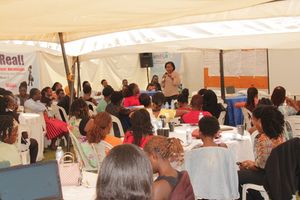
Writer: Gertrude Kamya Othieno. PHOTO/FILE
The challenge of delivering effective women’s empowerment programs in Africa is multifaceted, especially when beneficiaries come from backgrounds deeply rooted in both African traditions and Christian doctrine. These worldviews present different concepts of gender roles and power, creating a unique landscape for women’s development initiatives.
In many African traditional societies, men are seen as the cornerstone of the family and community. They hold substantial authority and responsibility, primarily expressed through physical contributions and visible leadership roles. Men are typically the breadwinners, providing for the family through farming, hunting, and other labour-intensive activities. Their physical strength and ability to protect and sustain the household are highly valued. This concept of power is intertwined with stewardship and guardianship, where men ensure the well-being and continuity of their lineage. Their authority is seen as crucial for societal stability, making them central figures in the socio-economic fabric of the community. Consequently, women’s empowerment projects can sometimes create conflict within the household, as they challenge these established roles.
On the other hand, Christian doctrine often shifts the focus from physical dominance to the power of the mind and spirit. The New Testament advocates for leadership grounded in servitude, humility, and moral integrity. Christian men are encouraged to lead by example, embodying virtues like compassion, selflessness, and spiritual guidance.
In a Christian household, the husband’s role is one of spiritual leadership rather than mere physical provision. This is epitomised in Apostle Paul’s letters, particularly in Ephesians 5:25-33, which call for husbands to love their wives as Christ loved the church, nurturing them spiritually and emotionally. This shift represents a fundamental divergence from traditional African notions of power, emphasising spiritual and mental stewardship over physical dominance.
Delivering women’s empowerment programs within this dual context presents several challenges. Women from these combined backgrounds often navigate dual expectations: traditional subservience to male authority and Christian spiritual submission and mental obedience to their husbands. Effective empowerment programs must carefully address these intertwined expectations to avoid reinforcing one set of constraints while attempting to dismantle another.
Balancing physical and spiritual empowerment is also crucial. Initiatives that focus solely on economic skills and financial independence might clash with ingrained spiritual doctrines that prioritise mental and emotional subservience. Conversely, programs that emphasise mental and spiritual empowerment may neglect the tangible economic inequalities women face. A holistic approach that integrates both aspects is essential for true empowerment.
Moreover, the emphasis on mental and spiritual authority in Christianity can sometimes result in a subtle form of manipulation and control over women. The spiritual leadership advocated in Christianity can translate into mental and emotional dominance, with expectations for women to submit to their husbands’ spiritual guidance potentially constraining their autonomy. This form of power operates on the level of beliefs, values, and personal identity, shaping women’s perceptions of themselves and their roles within the family and community. Such influence can be more insidious than physical dominance, potentially limiting women’s agency and perpetuating gender inequality.
Understanding these nuances is crucial for a comprehensive analysis of gender roles and power dynamics in African societies influenced by both traditional and Christian values. While African traditional thought prioritises physical contributions and visible authority, Christian doctrine emphasises spiritual and mental leadership. Both paradigms can reinforce gender inequalities, albeit through different mechanisms. Empowerment programs need to navigate these complexities carefully, addressing both physical and spiritual dimensions to foster true autonomy and equality for women.
By recognising and addressing these dual influences, empowerment initiatives can better support women in achieving autonomy and equality, ultimately leading to more harmonious and progressive communities.
Ms Gertrude Kamya Othieno , Critical Political Sociologist (Alumna - London School of Economics and Political Science) [email protected]




